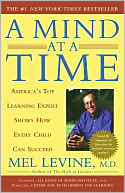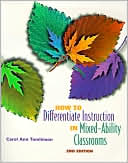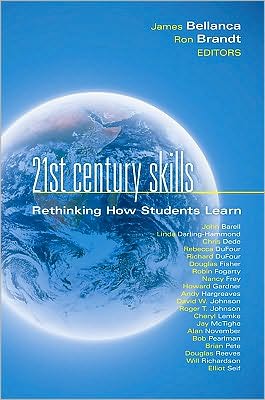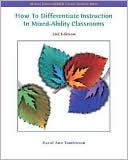A Mind at a Time: America's Top Learning Expert Shows how Every Child Can Succeed
Search in google:
"Different minds learn differently," writes Dr. Mel Levine, one of the best-known learning experts and pediatricians in America today. Some students are strong in certain areas and some are strong in others, but no one is equally capable in all. Yet most schools still cling to a one-size-fits-all education philosophy. As a result, many children struggle because their learning patterns don't fit the way they are being taught. In his #1 New York Times bestseller A Mind at a Time, Dr. Levine shows parents and those who care for children how to identify these individual learning patterns, explaining how they can strengthen a child's abilities and either bypass or help overcome the child's weaknesses, producing positive results instead of repeated frustration and failure. Consistent progress can result when we understand that not every child can do equally well in every type of learning and begin to pay more attention to individual learning patterns — and individual minds — so that we can maximize children's success and gratification in life. In A Mind at a Time Dr. Levine shows us how. Publishers Weekly Worried about the growing tendency to medicate and attach stigmatizing labels (such as ADD) to problematic learners, Levine, cofounder of the nonprofit institute All Kinds of Minds, offers parents a heartening new model of learning based on his deep respect for the uniqueness of individual minds. Levine's soft-spoken reading style lends to the tapes a personal, compassionate and reassuring tone that would be lost in the written word, gently guiding parents to identify their child's strengths and weaknesses in any of eight neurodevelopmental systems, including attention, motor, memory, language and social thinking. Describing himself as "a pediatrician with a mission," Levine confirms the resiliency of children's minds to overcome dysfunction, bolstering his argument with more than 30 years worth of case studies, stories of his own struggle with fine motor function, plenty of indicative symptoms corresponding to each "system of the mind" and helpful teaching concepts and tips to enhance all learning patterns. Levine's recommendation for listeners to follow up with his book and Web site rings true parents unfamiliar with their child's specific issues may find themselves a bit out of their depth, as the scope of this abridged version is extensive. Copyright 2002 Cahners Business Information.
Acknowledgments71A Mind at a Time: Introduction13A Mind's Possibilities23A Pediatric Perspective242The Ways of Learning27How Learning Works28Eight Systems30Neurodevelopmental Profiles35How a Mind's Profile Comes to Be38How Lifestyles May Affect Learning Styles43Splitting Rather Than Lumping46The Early Detection of Dysfunction48Some Adult Implications483Conducting a Mind: Our Attention Control System51The Mental Energy Controls57The Intake Controls63The Output Controls75The Impacts of the Attention Controls82Minds over Time: Keeping a Watchful Eye on the Attention Controls as Children Age83Practical Considerations864Remembering to Learn and Learning to Remember: Our Memory System90Short-term Memory93Active Working Memory99Long-term Memory104A Few More Memory Differences114The Outlook115Minds over Time: Keeping a Watchful Eye on Memory as Children Age116Practical Considerations1175Ways with Words: Our Language System120The Different Languages That Make Up Language121Language Levels128The Special Challenge of Language Production143Language and Its Ambassadorial Functions144Minds over Time: Keeping a Watchful Eye (or Ear) on Language as Children Age146Practical Considerations1476Making Arrangements: Our Spatial and Sequential Ordering Systems150Sequential Ordering153Spatial Ordering153Spatial Versus Sequential Ordering: Which Would You Rather Be Good At?166Minds over Time: Keeping a Watchful Eye on Sequential and Spatial Ordering as Children Age167Practical Considerations1687Mind over Muscle: Our Motor System170Forms of Motor Function172Minds over Time: Keeping a Watchful Eye on Motor Function as Children Age184Practical Considerations1858Some Peeks at a Mind's Peaks: Our Higher Thinking System188Conceptual Thinking192Problem-Solving Thinking196Critical Thinking203Rule-Guided Thinking207Creative Thinking209The Role of Intuitive Thinking in Influencing All Forms of Higher Thinking213The Higher Thinking System and the Other Neurodevelopmental Systems215Minds over Time: Keeping a Watchful Eye on Higher Thinking as Children Age216Practical Considerations2179Relating to Relating: Our Social Thinking System220The Big Three Social Missions225Social Functions and Dysfunctions228Are Some Kids Too Successful Socially?239Minds over Time: Keeping a Watchful Eye on Social Thinking as Children Age240Practical Considerations24110When a Mind Falls Behind245Constructing Neurodevelopmental Profiles246Identifying the Breakdown Points248When Bad Things Happen to Good Profiles260Mining a Child's Precious Assets262Identifying and Understanding Emotional Complications262Hows Instead of Whys: Focusing on Identifying and Fixing the Breakdowns Instead of Their Causes268The Benefits and Dangers When a Child's Mind Is Tested269Roadblocks and Outcomes in Adulthood27111Getting a Mind Realigned (but Not Redesigned)277Management by Profile277Accessing Special Services in School287The Use of Medication288Coaching and Mentoring289Raoul: An Example of a Child Who Was Managed by Profile29012Raisin' Brain: Homes for All Kinds of Minds295Know Thy Child296Responding to Gaps298Fostering Strengths, Knacks, Talents, Intuitions, and Affinities299Trying Not to Harm302Supporting Education303Maintaining an Intellectual Life at Home305Fostering Optimism and a Positive View of the Future30613The Right to Differ: Schools for All Kinds of Minds307Teachers: Their Roles and Their Training for Those Roles308Parents: Their Meaningful Involvement in a Child's Learning314Students: Learning About Learning and Learning About Their Kinds of Minds315Humane Schools: Protective and Nurturing Settings for All Kinds of Minds318Pathways: Greater Availability of Options for Success321The Educational Ambiance331Results335Neurodevelopmental Pluralism: A Mind at a Time as an Ethic335Helpful Readings and Other Resources337Index343







